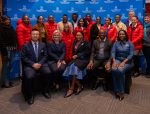In a bold move to transform Namibia’s fishing industry into a more inclusive and value-driven economic pillar, the government has announced an ambitious plan to create 15,000 new permanent jobs within the next five years. This initiative forms part of a broader strategy to significantly increase domestic processing of fish, reduce raw exports, and position the country as a comprehensive seafood economy.
The announcement was made by the Minister of Agriculture, Fisheries, Water and Land Reform, Inge Zaamwani-Kamwi during a crucial consultation with industry stakeholders in Walvis Bay. In her opening address, the Minister underscored the critical role of the fishing sector, which contributed 4.1% to the national GDP in 2024 and supports over 19,440 Namibians directly.
The new jobs are expected to be generated primarily in onshore processing plants, a segment that already boasts a significant workforce. The Minister highlighted that 71% of the sector’s employees are engaged in onshore operations, with women making up 45% of this workforce—a figure the new policies aim to improve further as part of a drive towards greater inclusivity.
Central to this job-creation strategy is a mandatory local processing requirement for all quota holders. The policy is aligned with the targets set out in the recently launched Sixth National Development Plan (NDP6), which aims to increase the percentage of value added to landed fish from 23% to 45%. This push for domestic beneficiation is not just about job creation; it also aims to reduce raw fish exports by 60% and develop at least three new high-value product lines for international markets.
“We call upon all industry stakeholders to partner in this national effort to transform Namibia from a fishing nation into a comprehensive seafood economy,” the Minister stated, emphasising that the ultimate goal is to ensure marine resources create maximum benefit for all Namibians through sustainable employment, skills transfer, and industrial development.
However, the Minister also acknowledged the challenges facing the industry, including fluctuations in Total Allowable Catches (TACs), which declined from 457,380 metric tonnes in 2023 to 438,080 in 2024. This reduction, largely due to declining fish biomass, directly impacts landing volumes and export earnings, which saw a slight dip from N$14.1 billion in 2023 to N$13.8 billion in 2024.
To ensure the sector’s stability and protect existing jobs, the Ministry is committed to implementing predictable policies and allocation systems that reward enterprises with strong employment records. The Minister called on quota right holders and processors to match government efforts with concrete employment guarantees and investments in workforce development.
In a significant policy shift aimed at promoting sustainability, the Minister also announced stricter enforcement of bycatch regulations. A new 2% bycatch threshold has been set, with operators required to surrender any excess to the government. Furthermore, the penalty fee for bycatch has been sharply increased from 15% to 50%. Habitual offenders risk severe sanctions, including license revocation, quota deductions, and public naming in an annual “name and shame” list.
The government also plans to convene a landmark Industry Indaba next year. This high-level leadership summit will bring together rights holders, processors, scientists, and employee representatives to tackle both immediate operational challenges and long-term strategic priorities.
Strengthening monitoring and compliance to combat Illegal, Unreported, and Unregulated (IUU) fishing was another key point, with plans to enhance surveillance and explore joint patrols with the Ministry of Defence and the Namibian Police.
As the Ministry reaffirms its commitment to the strategic pillars of NDP6—particularly environmental sustainability—the focus remains on promoting aquaculture, improving fisheries management, adding value, boosting local consumption, and strengthening surveillance.
The Honourable Minister concluded with a call for collective action, reminding stakeholders that through collaboration, the nation can overcome current challenges and ensure its marine resources continue to benefit both present and future generations. With a clear roadmap and renewed partnership between the public and private sectors, the goal of 15,000 new jobs appears within reach, promising a more resilient and prosperous future for Namibia’s fishing industry.










